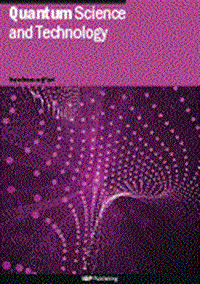Trade-off between information gain and disturbance in local discrimination of entangled quantum states
IF 5.6
2区 物理与天体物理
Q1 PHYSICS, MULTIDISCIPLINARY
引用次数: 0
Abstract
We establish an information gain-disturbance trade-off relation in local state discrimination. Our result demonstrates a fundamental limitation of local strategy to discriminate entangled quantum states without disturbance, which becomes more difficult as the entanglement of the states to be discriminated increases. For a set of maximally entangled states (MESs), the capability of local strategy is tightly suppressed, as random guessing without measurements saturates the bound provided by the trade-off relation. We also show that the trade-off can be circumvented when local operations are aided by pre-shared entanglement. To simultaneously achieve correct guessing of state and non-disturbance, an entirely different strategy from conventional state discrimination should be adopted to lower the cost of pre-shared entanglement. We explicitly propose an adaptive and non-destructive strategy based on the stabilizer formalism, which shows a strict advantage over conventional teleportation-based approaches in pre-shared entanglement cost for discriminating a set of MESs. As an application of the trade-off relation, we propose an entanglement certification protocol that is robust against depolarizing noise and generalize it to multipartite scenarios in a quantum network.纠缠量子态局部判别中信息增益与扰动的权衡
在局部状态判别中建立了信息增益-干扰权衡关系。我们的结果表明,局部策略在不受干扰的情况下判别纠缠量子态的基本局限性,随着待判别状态纠缠度的增加,这变得更加困难。对于一组最大纠缠态(MESs),局部策略的能力受到严格抑制,因为没有测量的随机猜测使权衡关系提供的边界饱和。我们还表明,当局部操作得到预共享纠缠的帮助时,可以避免这种权衡。为了同时实现对状态的正确猜测和无干扰,需要采用一种与传统状态判别完全不同的策略来降低预共享纠缠的成本。我们明确提出了一种基于稳定器形式的自适应非破坏性策略,该策略在预共享纠缠成本方面比传统的基于隐形传态的方法具有严格的优势。作为权衡关系的一种应用,我们提出了一种对去极化噪声具有鲁棒性的纠缠认证协议,并将其推广到量子网络中的多方场景。
本文章由计算机程序翻译,如有差异,请以英文原文为准。
求助全文
约1分钟内获得全文
求助全文
来源期刊

Quantum Science and Technology
Materials Science-Materials Science (miscellaneous)
CiteScore
11.20
自引率
3.00%
发文量
133
期刊介绍:
Driven by advances in technology and experimental capability, the last decade has seen the emergence of quantum technology: a new praxis for controlling the quantum world. It is now possible to engineer complex, multi-component systems that merge the once distinct fields of quantum optics and condensed matter physics.
Quantum Science and Technology is a new multidisciplinary, electronic-only journal, devoted to publishing research of the highest quality and impact covering theoretical and experimental advances in the fundamental science and application of all quantum-enabled technologies.
 求助内容:
求助内容: 应助结果提醒方式:
应助结果提醒方式:


